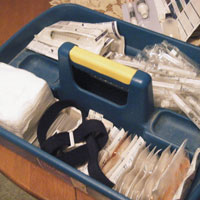Kody Schrimshaw’s morning routine is usually the same. The 15-year-old high school freshman, who has severe hemophilia A, wakes up to his alarm clock, brushes his teeth, crams his schoolbooks in his backpack and heads to school.
There’s just one variation, and it’s a big one. Every other day, before rushing out the door, Schrimshaw, of Black Creek, Wisconsin, grabs his factor from the fridge, drops into a chair by the door and infuses himself. He’s been on hemophilia prophylaxis since he was 13 months old and self-infusing since age 10. “I like to do it quickly—in and out,” he says.
Schrimshaw doesn’t see his morning infusions as a chore. He sees them as a passport to freedom. “Whatever you want to do more of, infusing yourself will let you do it,” he says. “Doing it myself gives me more freedom to do whatever else I want. I can go over to my friend’s for the night. I can go wherever I need to. I don’t need my parents there to infuse me.”
Freedom is appealing, but to get it, you have to handle your bleeding disorder. That means remembering to infuse and recognizing a bleed while juggling class assignments, work, dating and social pressure.
To find out how to take control of all the aspects of your life, consider these tips from other teens and adults in the know.
Fess Up
If you’re hesitant to disclose the details of your bleeding disorder with friends, you’re not alone.
“It’s a normal part of adolescence for teens to become increasingly idealistic about what they should look like and how they should behave and to worry about fitting in, bullying and peer pressure,” says Dawn von Mayrhauser, MSW, social worker at the University of Connecticut Health Center in Farmington. “Often, this makes flaws seem exaggerated in teens’ minds. They might feel invincible and deny their hemophilia or be less willing to share with peers that they have a bleeding disorder.”
[Steps for Living: Sticking Up for Yourself]
Ironically, a 2003 study in the journal Health Education and Behavior shows that teens feel better about themselves and their medical conditions when they open up to friends. They’re more likely to infuse, less likely to ignore bleeds and less likely to get injuries from dangerous activities, says Colleen Joiner, LMSW. She is a social worker at the Hemophilia Foundation of Michigan, a chapter of the National Hemophilia Foundation (NHF), in Ypsilanti.
The Hemophilia Foundation of Michigan created “A Bleeder and A Buddy,” a group in which teens with bleeding disorders invite friends without a disorder to a weekend retreat. There, the friends learn what bleeding disorders are, about the complications and what activities are risky for teens who have them.
“What happens is that the friends become more cautious or protective,” says Laura McGinity, LMSW, social worker for the University of Michigan Hemophilia and Coagulation Disorders Program in Ann Arbor. “They may say, ‘Maybe we shouldn’t do this. Maybe you should infuse.’ Since all teens—whether they have a bleeding disorder or not—get themselves into risky situations they can’t get out of, having a friend there helps.”
Besides, letting your friends in on this part of your life may draw you closer. Getting used to talking about your bleeding disorders with peers, whether they have bleeding disorders or not, can make you feel more comfortable with yourself, your disorder and your treatment. That’s what happened with Schrimshaw. He has attended bleeding disorders camp for years. He sends text messages and talks with his camp friends daily. “I can’t go a day without talking to someone from camp,” he says. “They just know what’s going on with life and everything that’s happening to you. They are one-of-a-kind people you can’t find anywhere else.”
Open Up

Schrimshaw knows how to tell new friends about his bleeding disorder. He runs through the drill. The first question after he reveals he has hemophilia is always, “What’s that?” His answer is brief: “I just say, ‘It means my blood doesn’t clot normally.’” The next question is usually, “What does that mean?” He has a simple answer for that, too: “If I got a cut, it wouldn’t stop bleeding for a lot longer time than it would for them. Then they pretty much get it.”
Different people need different degrees of detail, says Erin Stang, MSW, social worker at the University of Colorado Denver Hemophilia and Thrombosis Center. Friends, for instance, don’t need to know more than what Schrimshaw shares, but others do. Coaches, for instance, need all the details. Tell your coaches and trainers about your diagnosis and which activities are safe and which you need to avoid. Your parents and your doctor will probably have to provide a waiver for you to play at school, and you’ll probably have an individualized health plan with your school that details how the school should respond to your medical needs.
Don’t be surprised if your parents want to accompany you to talk to your coach about your bleeding disorder, says Stang.
“Ultimately, it’s the parent’s responsibility to consent for the teen to play,” she says. “Parents need to be sure coaches and trainers know what to do in an emergency. They should ensure coaches and other sports supervisors know of their teen’s bleeding disorder before allowing them to play.”
Educate emergency room staff. Provide them with a letter from your hematologist describing what type of factor deficiency you have, how much factor you have in your blood, the type and dosage of factor product you use and what to do first. Also, provide your health insurance information.
[Steps for Living: When To Go To the Emergency Room]
Speak Up
If you don’t know some of your health information or aren’t sure how to talk about your bleeding disorder, don’t just let it go. Managing any chronic illness means asking questions until you understand, and speaking up until you get your needs met.
That may require you to speak up in a way that you never have before, says Stang. When you meet with your treatment team, don’t just accept whatever they tell you. If you don’t understand something, ask questions until you get answers.
Girls with bleeding disorders may have to ask teachers for permission to leave class to check on a very heavy period or go to the nurse’s office. Talk to your treatment team about ways to reduce monthly bleeding and how to deal with cramping and pain.
Stand Up
Another aspect of every teenager’s life is the quest for independence. Practice doing your infusions yourself. For teens whose parents still infuse them, order their medications and manage their insurance, it can be easy to postpone this particular part of growing up. But leaning on parents leaves teens unprepared to deal with bleeding disorders on their own. That’s the situation for Meredith Rash. The 19-year-old from Austin, Texas, has von Willebrand disease and recently moved two and a half hours from her parents’ home. Like many teens with von Willebrand disease or mild hemophilia, Rash has had to infuse infrequently. She knows less about how to self-infuse and about her disorder in general than teens with severe or moderate hemophilia. Some teens with mild bleeding disorders may not even know how much factor to use or how to recognize a bleed, though Rash knows both.
[Steps for Living: Building Independence]
Still, Rash admits she’s unprepared to care for her health. Right now, her plan is to hope she doesn’t have a bleed. She hasn’t found the nearest treatment center. If she does, she says she will teach an emergency room nurse how to infuse her—but that may be difficult since she doesn’t know how to infuse herself.
Rash knows that her plan is faulty. “I need to learn to infuse,” she admits. “But now I have a day job and a night job. I have no time.”
Your best bet is to avoid procrastinating about your health. The time to learn how to self-infuse is before you leave home. “All teens are pushing back, trying to learn to be independent, anyway,” says Edward J. Kuebler, LMSW-AP, senior social worker at the Gulf States Hemophilia and Thrombophilia Center in Houston. “They have to practice being independent.”
Follow Up
When Schrimshaw’s friends suggest playing football, he considers the bleeding risks, but isn’t always as cautious as he could be. “Sometimes, someone wants to do something dumb and I go along, like playing football or soccer,” he says. “I think about my hemophilia, but I don’t always think things through and sometimes I end up not being as safe as I should be.”
Like Schrimshaw, you may know you shouldn’t engage in risky physical activities. Before you act, talk through the consequences with a close friend or your parents. Do research online or discuss with your hematologist the consequences for someone with your bleeding disorder. For instance, learn more about the impact of a serious head bleed from a football or a bike-racing injury, or the long-term consequences of untreated joint bleeds.
Join Up
Talking to other teens with bleeding disorders can alleviate some of the pressures you’re feeling. If you want to get involved with other teens with bleeding disorders in your area, NHF’s National Youth Leadership Institute (NYLI) is a good place to start. The group gives you a chance to get involved and lead events for other teens. Founded in 2004, NYLI involves young adults in the bleeding disorders community by leading events such as camps and retreats for teens and young people with bleeding disorders. Joiner says attending these events and camps can make teens and younger children feel much more comfortable with their bleeding disorder. This can result in making them more likely to talk openly and appropriately about their disorder with friends, more likely to infuse and more likely to think before engaging in activities that could lead to a bleed.
[Steps for Living: All About Camps]
Set up
Finally, try to make life simpler. Consider making your bleeding disorder treatment part of your everyday routine:
- Create an infusion schedule. Infuse at the same time and place every time.
- Put your supplies in one place. Designate an area for your supplies—one drawer in the fridge, for example—and make it off-limits to anything else.
- Use a calendar. Near the spot where you infuse, hang a wall calendar, and place the sticker from your medicine on the day you infused. That way, you can tell immediately when you should do it next.
- Keep a treatment log. Logs are like calendars, helping you keep track of when you’ve infused, when you’re due and when you need to order more factor.
This setup works for Schrimshaw. Although prophylaxis means he hasn’t had a bleed in years, he still knows he has to be proactive about his hemophilia. If you’re like him and rarely bleed because of prophylaxis or a mild disorder, remember: Breakthrough bleeds and accidents can happen.
“You should always be thinking about your bleeding disorder and planning ahead,” Schrimshaw believes.


 For teens, part of growing up is doing things their parents don’t like and paying the price. If you’re a parent, this can be torturous to watch. But it’s important to let teens make small mistakes, guide them through fearful moments and set limits when it’s dangerous, says Erin Stang, MSW, social worker at the Mountain States Regional Hemophilia and Thrombophilia Center in Aurora, Colorado.
For teens, part of growing up is doing things their parents don’t like and paying the price. If you’re a parent, this can be torturous to watch. But it’s important to let teens make small mistakes, guide them through fearful moments and set limits when it’s dangerous, says Erin Stang, MSW, social worker at the Mountain States Regional Hemophilia and Thrombophilia Center in Aurora, Colorado.